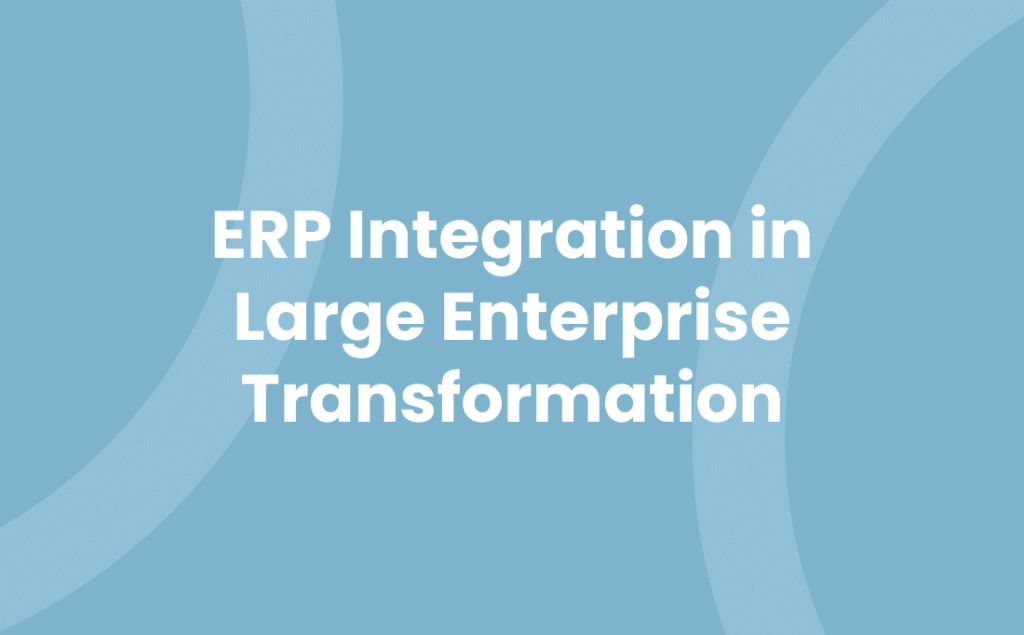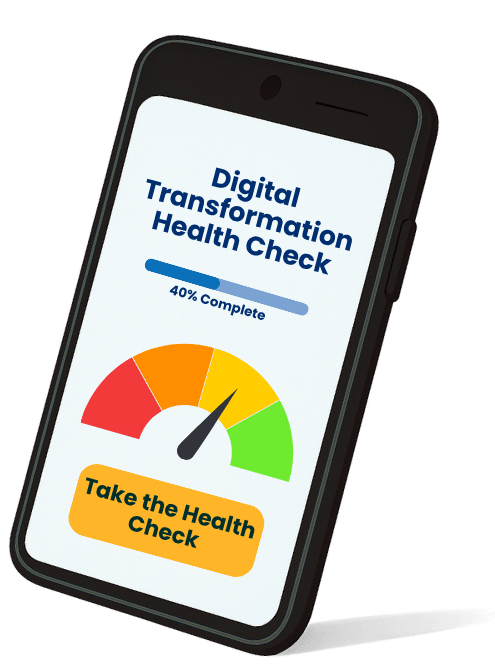In the fast-paced digital era, you’re likely grappling with the challenges of integrating cutting-edge technology into your large enterprise. It’s a daunting task, isn’t it? But fear not, we’re here to guide you through the labyrinth of digital transformation and ERP system integration.
ERP systems, the backbone of modern enterprises, are evolving at a rapid pace. They’re no longer just about managing resources; they’re the driving force behind successful digital transformations. But how do you ensure your ERP system is up to the task?
In the following sections, we’ll unravel the complexities and provide you with a roadmap to successfully integrate ERP systems in your digital transformation journey. So, let’s dive in and explore the future of large enterprises together.
Understanding Digital Transformation in Large Enterprises
The first element to grasp about digital transformation, particularly for large enterprises, is its sheer scope. It’s more than simply implementing new technologies. It encompasses changes to the entire business landscape – from culture and operational models to customer experiences. Think of it as a refined recipe, a mix of integrating different technologies, data management, and above all, firm commitment from every level.
ERP (Enterprise Resource Planning) integration plays a pivotal role in said transformation. Think of your ERP system as the spinal cord of your enterprise. It might lack the ‘flashiness’ of cutting-edge technology, but it forms the core. With large, sprawling enterprises, it’s about mapping organisational complexities into a single system. This ERP integration creates well-oiled processes that are key to a successful digital transformation.
You might wonder, what’s the hallmark of successful digital transformation? It lies squarely in data-driven decision-making. With integrated ERP systems, your enterprise can now effectively collate, analyse, and utilise data – the real gold of the digital era. For instance, production bottlenecks might be identified swiftly, or customer preferences gleaned easily, leading to informed decision-making.
So, how to chart the course? A well-defined ERP implementation strategy is vital. However, this strategy must be adaptable. The digital landscape is ever-evolving, and your strategy must keep pace. It’s about building an agile enterprise, able to pivot when necessary.
Digital transformation serves as the cornerstone of competitiveness for large enterprises in the digital era‚ and ERP integration forms an intrinsic part of this transformation. By harnessing the power of ERP digital transformation, large enterprises not only adapt but thrive in the ever-evolving digital domain.
ERP Systems: The Heart of Digital Transformation
Enterprises, especially larger ones, face a multitude of operational challenges in today’s digital age. One critical strategy for overcoming such hurdles lies at the core of their IT infrastructure: ERP systems. ERP digital transformation within large enterprises provides an integrated view of core business processes. This integration means the data you collect is accurate, consistent, and real-time – an invaluable gift in fast-paced business landscapes.
One principal advantage of integrating ERP systems in your digital transformation strategy is a unified data platform. This platform simplifies the process of collecting, analysing, and making decisions based on data. For instance, you no longer need to join pieces of information from different departments, as ERP integration centralises data, providing a single version of the truth.
Enterprise ERP integration also boosts operational efficiency by streamlining various business processes in an organisation. For example, imagine your HR, finance, and procurement adhering to a single system. The simplification of processes aids in reducing IT-related costs and aids in the reduction of waste, all the while boosting production levels.
Moreover, ERP systems’ adaptability offers the possibility of redefining how an enterprise operates, from supply chains to customer service. Through integrating new technologies such as AI, machine learning, or IoT in your ERP system, you’re able to undergo digital transformations and compete effectively in the digital era.
ERP systems are pivotal in the digital transformation discourse for large enterprises. Through integration, spare time and resources can be employed to focus on achieving strategic objectives. The marriage between digital transformation and ERP systems provide businesses the armour to weather future technological disruptions. For large enterprises, embracing this integration isn’t just a smart move‚ it’s an essential one.
Integration of ERP Systems in Digital Transformation
Large enterprises integrate Enterprise Resource Planning (ERP) systems for numerous reasons, with digital transformation at its core. ERP systems bring value to operations, enhance productivity, and provide accurate, real-time information. In effect, ERP integration bolsters your company’s digital transformation journey, offering more than mere technology adoption.
Streamlined Business Processes
ERP systems lay a solid foundation for seamless workflows. They integrate diverse business operations, eliminating data silos and promoting efficient communication. For instance, an ERP system can connect sales, manufacturing, and supply chain departments, ensuring harmonious inter-departmental operations. In a large enterprise, ERP integration simplifies processes and mitigates risks of error, enabling you to focus on your strategic objectives.
Improved Decision-making
In the realm of digital transformation, data is king. ERP systems offer unified data platforms, providing accurate and relevant data when you need it most. The integrated real-time data enables informed decision-making, circumventing potential problems and identifying profitable opportunities. Large enterprises gain a significant edge by switching from data-driven to insight-driven decision-making, propelling them ahead in the digital landscape.
Readiness for Future Technologies
Embracing ERP integration means being ready for the future. It prepares your enterprise for significant technological disruptions such as artificial intelligence (AI) and the Internet of Things (IoT). ERP systems evolve with new innovations, enabling your business to stay ahead of the curve. Large enterprises have much to gain from this pro-activity, unlocking vast potential for growth in the digital era.
In short, ERP integration is central to your digital transformation journey, no longer just an upgrade but an essential steadfast component for success. The integration boosts operational efficiency and enables large enterprises to maintain competitiveness in an ever-changing business landscape. By adopting ERP integration, your business is not merely existing in the digital era but strategically leveraging it for success.
Evaluating the Success of Digital Transformation in Large Enterprises
Often, businesses find the evaluation of their digital transformation success quite challenging, particularly when incorporating ERP systems. For an effective assessment, large enterprises typically adopt key measures.
Firstly, Operational Efficiency tops the list. Following ERP integration, a significant reduction in errors, redundancies and manual tasks serves as a positive sign. This efficiency leads to streamlined business processes, enhancing your company’s overall productivity.
Secondly, Data Accessibility becomes crucial. An ERP system collates data from various departments into a single platform. So, easier real-time data access for decision-making indicates successful digital transformation.
Thirdly, Inter-departmental Communication improves. With ERP integration, information flows seamlessly across the enterprise, eliminating data silos. The resultant smooth communication depicts ERP’s positive impact on the digital transformation journey.
Next, Enhanced Customer Experience reflects success. Digital transformation, coupled with ERP systems, affords a holistic view of customers. If your customers are happier due to personalised services or faster response times, it’s proof that your transformation efforts are paying off.
Moreover, Strategic Decision-making benefits from ERP integration. If your business decisions, grounded in real-time data and insightful analytics, lead to better results, then the ERP digital transformation is indeed advantageous.
Lastly, large enterprises must eye Adaptability to Future Technologies. ERP integrated digital transformation prepares businesses for emerging technologies. Hence, your enterprise’s readiness for AI, IoT etc., echoes the stratagem’s success.
The key to evaluating the success of digital transformation in large enterprises lies in tracking these metrics. Remember, the aim is not just to implement digital tools like ERP, but to fully utilise them for process improvements and strategic advantage.
Challenges Faced during Digital Transformation and Integration with ERP Systems
Despite the impressive benefits, embarking on an ERP digital transformation for large enterprises has its hurdles. While ERP systems help modernise businesses, their integration presents challenges that require careful planning and execution.
- Resource Management: It takes significant time, human resources, and capital to implement an ERP system. This extensive commitment can strain your resources, especially in large-scale enterprises dealing with multiple installations, upgrades, and customisations.
- Data Quality and Migration: Moving existing data into a new ERP system can be problematic. Accurately mapping and migrating data from legacy systems to the new environment demands meticulous oversight. Moreover, ensuring the highest levels of data quality post-migration is an uphill battle.
- Change Management: To optimise an ERP integration, altering your existing business processes is often necessary. This transformation can result in employee resistance due to changes in familiar work patterns and routines. Comprehensive awareness and training programs are paramount to overcome this obstacle.
- Technological Complexity: Enterprise ERP systems are complex by design, encapsulating an array of business functionalities. Grasping the intricacies of these technologies necessitates expert knowledge and technical skills.
- Choosing the Right ERP System: Not all ERP systems are tailor-made for your business requirements. Identifying the one that fits your business model and is adaptable to emerging tech trends is a complex task.
- Integration Concerns: ERP systems must sync seamlessly with existing software platforms. However, integration may be tricky, especially if your enterprise uses a combination of custom and off-the-shelf software.
- Ensuring Security: As ERP systems contain sensitive company and employee data, implementing robust security protocols is crucial to prevent potential cyber threats.
It’s clear that while ERP integration is a potential game-changer for large enterprises, it’s not a straightforward endeavour. Navigating these challenges successfully can solidify your digital transformation ambitions, helping your enterprise thrive in an ever-evolving business landscape.
The Future of Digital Transformation and ERP Systems within Large Enterprises
Anticipate an accelerated pace of digital transformation in large enterprises. In the wake of rapidly evolving technology and market demands, ERP systems play a pivotal role. They provide a comprehensive, integrated platform, that manages core business processes efficiently, thereby driving the digital transformation journey.
Large enterprises consistently strive for operational excellence. Your company, being no exception, now relies heavily on advanced ERP systems. These systems boost productivity, foster informed decision-making, and facilitate smooth, streamlined processes. ERP integration plays a key role in times of digital transformation, breaking down data silos and preparing businesses for future advancements like AI and IoT.
An optimised ERP system fosters effective inter-departmental communication, fosters data accessibility, and enhances your customer’s experience. Furthermore, it strengthens strategic decision-making processes and increases adaptability to upcoming technologies. Evidence demonstrates that future digital transformation initiatives will revolve around a more robust, strategically integrated ERP system. An interconnected ERP digital transformation platform is vital for survival in the competitive business landscape of large enterprises.
However, ERP integration is not free from challenges. From managing resources and ensuring data quality, to dealing with migration issues and change management, there’s a vast array of obstacles to tackle. Technological complexity, choosing the right ERP for your business, addressing integration concerns, and prioritising security are all part of this process.
But fret not. With every challenge, new enterprise ERP integration solutions keep surfacing. Future advancements in ERP systems promise more flexible, agile, and modular solutions designed to suit the varying needs of different enterprises. They focus on enhancing user experience, offering real-time insights, as well as fostering collaboration and inter-connectivity.
In a nutshell, the future of ERP systems in large enterprises is a bright one. They are set to facilitate more streamlined, effective, and integrated digital businesses. So get ready to embrace this digital transformation era with open arms. It’s only the beginning of a whole new journey.
Strategies for Successful Digital Transformation and ERP System Integration
Unlocking the potentials of digital transformation requires thought-through strategies to integrate ERP systems effectively. Following a seamless ERP integration, businesses notice enhanced operational proficiency, sustainable growth, and a robust competitive advantage.
Consider these keys to optimising large-scale digital transformation:
- Engage Stakeholders: Drive collaboration among the board members, IT leaders, and employees. Their collective insights can shape an appropriate digital transformation strategy, encompassing ERP integration.
- Define Clear Goals: Determine objectives explicitly before embarking on the ERP integration. Goals may include streamlining processes, enhancing customer experience, or improving data analysis capabilities.
- Choose the Right ERP System: Each ERP has a precise fit and functionality. Evaluate different ERP packages and select one that aligns with your business objectives and current IT architecture.
- Plan for Data Migration: Design an effective procedure to shift existing data to the new ERP system. A well-defined data migration plan minimises disruption in business operations post-integration.
Incorporating digital transformation through ERP integration can be daunting but yields technical and business benefits. For instance, your employees get real-time access to crucial data for informed decision-making. Businesses can also predict trends and act on them swiftly, leading to sustainable company growth.
By integrating an ERP system, businesses uproot data silos and connect different enterprise applications. Thus, creating a unified business environment. This leads to an easy, quick, and accurate flow of information, enhancing the efficiency of large enterprises’ operations.
In essence, a strategic and well-executed ERP integration equips your business for the future, amplifying your readiness for the eventual conclusion of the digital transformation journey. Hence, it’s vital to follow these strategies for successful ERP integration during digital transformation endeavours.
Conclusion
So, you’ve seen how ERP systems can be a game-changer in the digital transformation of large enterprises. They’re not just tools for productivity enhancement or informed decision-making, but vital components in overcoming challenges like resource management and security. Remember, the key to successful digital transformation lies in engaging stakeholders, defining clear goals, selecting the right ERP system, and planning meticulously for data migration. By integrating ERP systems, you’re not only eliminating data silos and enhancing operational efficiency but also gearing up for future technological advancements. The competitive business landscape demands strategic ERP integration. It’s your ticket to navigate the digital transformation journey effectively and ensure your enterprise is future-ready.



